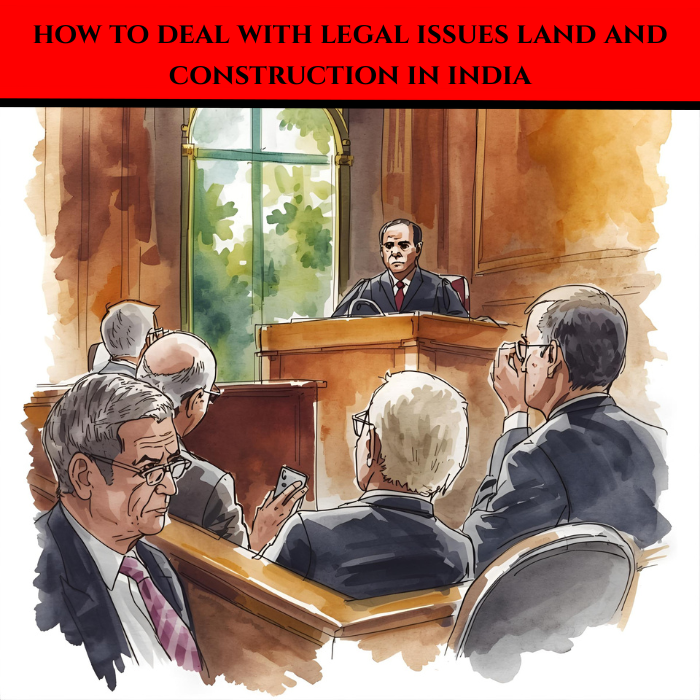Building or buying property in India comes with big rewards — and legal complexity. From title searches and encumbrance certificates to building-plan approvals, land-conversion rules and RERA compliance, every stage has paperwork and potential legal pitfalls. This guide explains the common legal issues in land and construction in India (with emphasis on Uttar Pradesh / Lucknow procedures), shows how to prevent them, and points you to the right remedies when disputes arise. I’ve included current, India-authoritative references for the most important rules and processes so you get accurate, up-to-date guidance you can act on.
Start with rock-solid due diligence: documents you must verify before you buy or build
The single best way to avoid future legal trouble is full due diligence before you sign anything. For land purchases and construction projects insist on verified originals of the following: the title deed and chain of title (how the seller acquired the property), the latest encumbrance certificate (EC) showing there are no registered mortgages or charges, mutation/khata (if applicable) that shows the owner’s name in local revenue records, all previous sale deeds, land tax receipts, and approved layout or plan documents. You should also check whether the land is agricultural or non-agricultural (conversion status), and whether any court cases, government claims or liens exist against it. You can apply for an encumbrance certificate through your state’s registration/land records portal or the central services portal; the EC is an essential document to confirm clean title. India Government Services
Understand land classification and conversion rules in Uttar Pradesh
One of the most frequent legal headaches is buying land that’s classified as agricultural but later required for residential or commercial construction. In UP, conversion from agricultural to non-agricultural use requires permission from the competent revenue authority (often SDM or other local authority) under state rules (often referenced as Section/Rule 143 or equivalent local provisions). Conversion attracts fees and conditions, and building on agricultural land without conversion can lead to demolition orders and heavy penalties. Always confirm the current land use classification online (state land portals such as Bhulekh/Bhunaksha where available) and obtain the formal conversion order before starting construction or selling plots. Local legal counsel or a reputable construction company in Lucknow can help navigate the conversion application and inspection process. ezyLegal+1
Building approvals: follow local bye-laws and use the online systems
Before starting construction you must get building plan approval from the local development authority or municipal body. In Uttar Pradesh many local bodies now use the Uttar Pradesh Online Building Plan Approval System (UPOBPAS) which automates clearance and enforces compliance with state model building byelaws. Submitting an accurate set of architectural and structural drawings, an engineer’s/architect’s certificate, and required NOCs — and then getting the approved plan in writing — is non-negotiable. Building without sanctioned plans risks demolition notices, penalty fines, insurance denial, and refusal of occupancy certificates. If your project is in Lucknow, the Lucknow Development Authority (LDA) issues development and building permissions and publishes model bye-laws and procedural guidance; follow their checklists closely. upobpas.in+1

RERA: protections for buyers and obligations for developers
If you are buying an apartment or plotted development from a promoter, check whether the project is registered with the state RERA (Real Estate Regulatory Authority). RERA requires promoters to register projects, disclose sanctioned plans, project timelines, bank-linked accounts for project funds, and ongoing progress updates; it also creates a fast remedy for delays, deficient construction, or false promises by developers. Buyers can file complaints with the state RERA authority seeking remedies such as compensation, completion orders, or project rectification. Always confirm the project’s RERA registration number on your state RERA portal before paying a major advance. Amanora
NOCs and sectoral clearances you cannot ignore
Certain constructions require additional NOCs depending on the site and use: fire-safety clearance for multi-storey buildings, environmental clearances for large projects, pollution control or sewage/NOC from local water and drainage authorities, and in some areas a no-objection from utilities (electricity, telecom) or from nearby rail/road/airport authorities if the plot is close to restricted zones. For gated layouts or plots near protected features you may need heritage or archaeological clearances. Collect all required NOCs in writing before construction; verbal assurances won’t protect you later.
Drafting strong agreements: sale deeds, builder-buyer agreements, and contractor contracts
Legal disputes often arise from ambiguous or incomplete contracts. Whether you are buying land, appointing a builder, or hiring a contractor, use written, lawyer-reviewed agreements that clearly state scope, timelines, payment schedule (linked to milestones), penalties for delay, quality standards, variation/change order procedure, warranty period, and dispute resolution clauses (arbitration vs courts). For apartment purchases, insist that the builder’s agreement complies with RERA provisions and includes clear possession dates, carpet area definitions and refund/compensation terms for delays. For construction contracts (EPC or turnkey), include retention clauses, performance guarantees, and detailed material specifications so “substandard materials” is not a grey area later.
What to do if you suspect title fraud, forgery or encroachment
f you discover forged documents, fake sellers, or encroachments after a transaction, act fast: register a police complaint (FIR) documenting the fraud, get an advocate to seek urgent injunctive relief from civil courts to stop transfers or construction, and lodge parallel complaints with the registration authority for cancellation/rectification of the register where possible. For encroachments by neighbours, revenue authorities (tehsildar/SDM) may be able to issue notices; for larger, systematic frauds, file suit for declaration and cancellation in civil court and seek possession by executive action or court orders. Preservation of evidence — original sale deeds, receipts, communications — is critical to success.
Dispute resolution: RERA, consumer forum, arbitration and civil courts
Which forum to approach depends on the issue. For developer-buyer disputes in residential/commercial projects, RERA is a specialised and faster forum. For defective works or deficiency in services by contractors/developers, consumer forums (district/state consumer commissions) are an option for smaller monetary claims. For contractual disputes where the contract has an arbitration clause, parties must usually follow arbitration (and later challenge awards in courts on narrow grounds). For land title disputes, injunctions, partition suits, or claims against the state, the civil courts and revenue courts remain the primary forums. Lok Adalats can be used for faster settlement of pending civil cases in many districts. Early legal advice helps pick the most effective forum and preserve rights such as limitation periods. (For RERA filing procedures refer to your state’s RERA portal; for Lucknow projects check the relevant UP RERA pages.) Amanora

Tax, stamp duty and registration: don’t underestimate these costs
Every property transfer must be stamped and registered at the state registration office; the stamp duty percentage and registration charges vary by state and may change annually. In Uttar Pradesh stamp duty and registration charges are significant components of transaction cost and must be paid at the time of registry to make the transfer legally effective. Keep updated with the state Stamp and Registration Department rates and rules; paying proper stamp duty also prevents later challenges to the validity of the deed.
Practical step-by-step checklist to prevent legal problems (before & during construction)
- Title audit: Commission a lawyer’s title search covering at least 30 years if possible and obtain an encumbrance certificate for the relevant period. India Government Services
- Confirm land use: Verify Bhulekh/Bhunaksha records and obtain conversion orders if required. ezyLegal
- Get approved plans: Secure sanctioned building plans and all required NOCs from the municipal/development authority (UPOBPAS/LDA for Lucknow). upobpas.in+1
- Register sale deed: Pay stamp duty and register the deed at the sub-registrar office; keep certified copies. igrsup.gov.in
- Use written contracts: Have architect/engineer sign off on drawings; use detailed builder/contractor agreements and retain performance security.
- Compliance during construction: Follow building byelaws, maintain statutory records, pay labour dues, and obtain periodic inspections where required.
- Handover formalities: Get occupancy certificate, completion certificate, and transfer utility connections in writing before accepting possession.
When to involve professionals (and who to hire)
A competent local property lawyer (familiar with UP procedures), a licensed architect or civil engineer, and a chartered accountant for tax compliance are must-haves. For complex projects use a project management consultant or an experienced construction company in Lucknow that can handle statutory approvals, coordinate NOCs, and manage contractors. Early engagement of these professionals saves time, cost, and legal headaches.
Final notes — be proactive, not reactive
Legal risks in land and construction are manageable if you follow due diligence, obtain the right approvals, use robust contracts, and keep clear records. If a dispute arises, act promptly: preserve documents, register complaints where required, and choose the right dispute forum. Laws and local processes do change, so for any specific case — conversion fees, current stamp duty slabs, or RERA filings — always check the latest government portals (e.g., state RERA, stamp & registration portal, UPOBPAS, LDA) or consult a local lawyer. The links and references cited in this article point you to the official systems used in Uttar Pradesh for approvals and records

